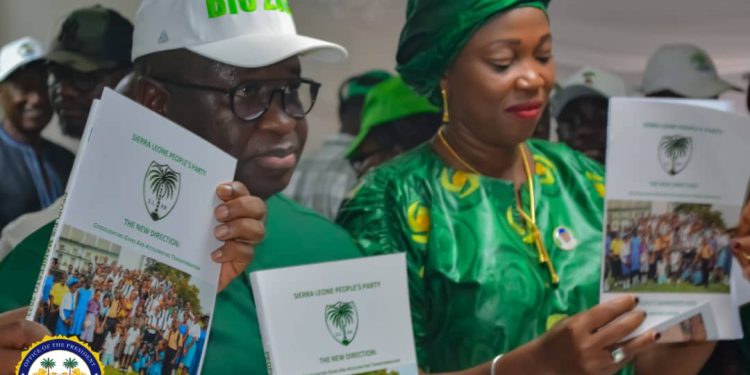The Sierra Leone People’s Party SLPP, established as a unifying force for the newly independent Sierra Leone, was built on a foundation of inclusivity and national development. Sir Milton Margai, the country’s first Prime Minister and a founding member of the SLPP, prioritized education, healthcare, and agricultural development, setting the stage for a stable and self-sufficient Sierra Leone. His leadership was marked by a conciliatory approach that sought to bridge ethnic and regional divides, embodying a governance style focused on collective national progress.
The post-Margai years were fraught with challenges, including political infighting and periods of instability, but the SLPP managed to retain its reputation as a party rooted in democratic ideals and service to the people. This legacy was further reinforced during Tejan Kabbah’s tenure, particularly in the aftermath of the devastating civil war.
Ahmad Tejan Kabbah, who led Sierra Leone from 1996 to 2007 (with a brief interruption during the AFRC coup), remains one of the most revered figures in the SLPP’s history. His administration was characterized by a relentless focus on peace, reconstruction, and institutional reform. Tasked with rebuilding a war-torn nation, Kabbah emphasized reconciliation through the Truth and Reconciliation Commission (TRC) and worked tirelessly to strengthen democratic institutions.
Kabbah’s government also prioritized international diplomacy, securing significant aid and forging partnerships to rehabilitate the nation’s infrastructure, healthcare, and education systems. His leadership style was inclusive, bringing together Sierra Leoneans from all walks of life to foster national unity. Despite the challenges of corruption and weak institutions, Kabbah’s tenure is remembered as a time of relative stability and hope for a brighter future.
When Julius Maada Bio assumed the presidency in 2018, many Sierra Leoneans hoped he would build on the legacies of his SLPP predecessors. Campaigning on promises of transformation, his administration introduced flagship initiatives such as the Free Quality Education program, touted as a game-changer for the nation’s youth. However, six years into his tenure, the realities of Bio’s governance paint a starkly different picture from that of Kabbah or earlier SLPP leaders.
Unlike Kabbah, whose leadership sought to bridge divides, Bio’s administration has faced criticism for exacerbating regional and tribal tensions. His government is often accused of favoring the Mende-speaking regions of the South and East, alienating other ethnic groups and fostering a sense of marginalization. This has undermined the national unity that past SLPP administrations worked hard to cultivate.
While Kabbah’s administration grappled with rebuilding a war-torn economy, Bio inherited a relatively stable nation. However, under his watch, the economy has deteriorated significantly. The Leone has lost substantial value, inflation has skyrocketed, and basic commodities have become increasingly unaffordable. Critics argue that rampant corruption within Bio’s administration has diverted resources away from critical areas such as healthcare, infrastructure, and job creation, further exacerbating the nation’s hardships.
Another stark departure from Kabbah’s leadership is Bio’s governance style, which many perceive as increasingly autocratic. While Kabbah relied on consensus-building and diplomacy, Bio has been accused of sidelining dissenting voices, suppressing press freedom, and undermining democratic norms. The recent controversial elections, marred by allegations of irregularities and lack of transparency, have further damaged the credibility of his government.
Bio’s flagship programs, including the Free Quality Education initiative, have faced criticism for poor implementation and lack of tangible results. While the initiative has increased enrollment, many schools remain underfunded and understaffed, and the quality of education has not improved significantly. This stands in contrast to Kabbah’s pragmatic approach, which focused on laying a solid foundation for sustainable development.
Bio’s leadership not only marks a departure from Kabbah’s legacy but also poses challenges for the SLPP’s identity and future. The party, once celebrated for its commitment to national development and unity, now risks being defined by tribalism, economic hardship, and political suppression. This shift has alienated many long-time supporters and raised questions about the SLPP’s ability to remain a unifying force in Sierra Leonean politics.
Despite the challenges posed by Bio’s administration, the people of Sierra Leone continue to endure. Their resilience, forged through decades of hardship, remains a testament to their unwavering hope for a better future. However, endurance alone cannot sustain a nation. Sierra Leoneans are increasingly demanding accountability and a return to the principles that once defined the SLPP.
Julius Maada Bio’s leadership represents a stark departure from the legacies of Ahmad Tejan Kabbah and other past SLPP leaders. While Kabbah’s administration was defined by inclusivity, reconstruction, and a commitment to democratic principles, Bio’s tenure has been marked by economic mismanagement, tribalism, and autocratic tendencies.
For the SLPP to reclaim its identity as a party of progress and unity, it must address these shortcomings and realign itself with the values that once made it a beacon of hope for Sierra Leoneans. As the nation navigates this critical juncture, the resilience of its people will remain its greatest asset—but only if matched by visionary and selfless leadership.











